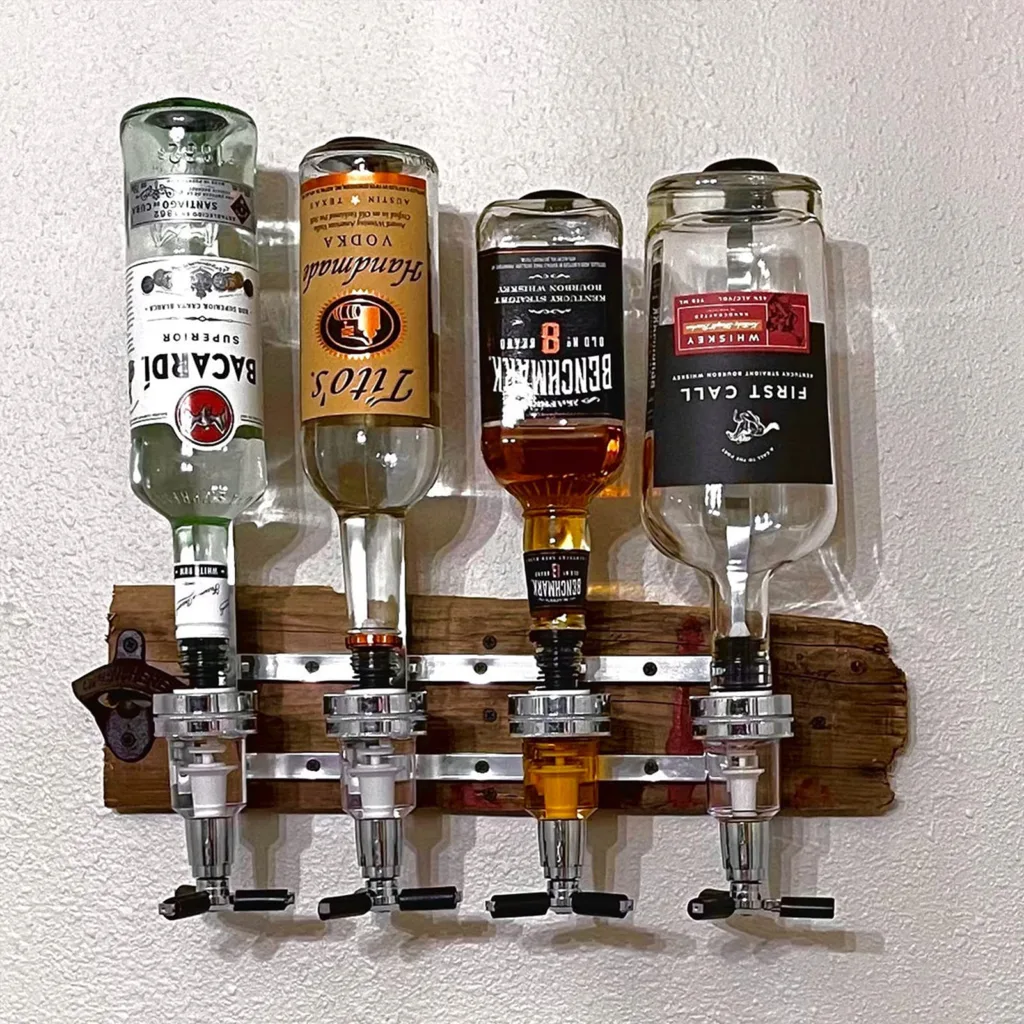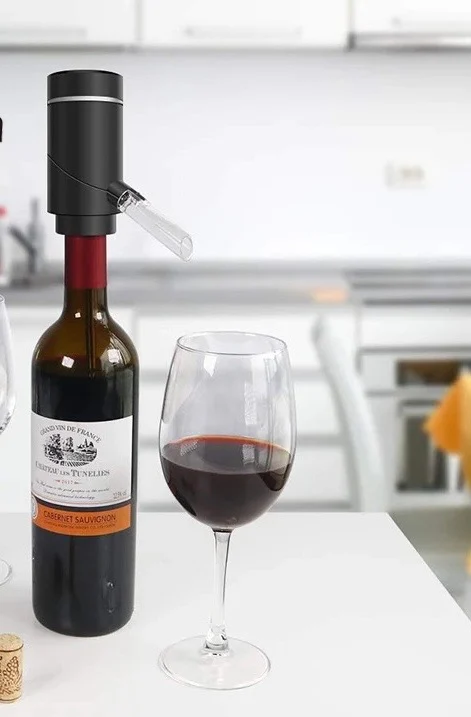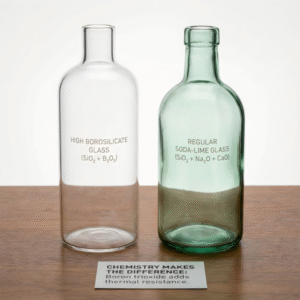Liquor bottle dispensers are essential tools for both home enthusiasts and commercial establishments seeking efficiency and elegance in their beverage service. These devices not only streamline the pouring process but also enhance the overall presentation of your bar. In this comprehensive guide, we will explore everything you need to know about liquor bottle dispensers, from their functionality and benefits to how to choose the right one for your needs.
By the end of this guide, you’ll have a thorough understanding of liquor bottle dispensers and be equipped to make an informed decision, whether you’re outfitting a home bar or a professional setting.

1.What is a Liquor Bottle Dispenser?
A liquor bottle dispenser is a device designed to control the flow and measure of alcohol poured from a bottle. These dispensers come in various forms and functionalities, each tailored to different needs and preferences. Understanding the different types and their mechanisms is essential for selecting the right one for your needs.
Definition and Basic Functionality
At its core, a liquor bottle dispenser is intended to streamline the process of pouring drinks, ensuring that each pour is precise and consistent. This functionality helps in reducing waste and maintaining uniformity in the amount of alcohol served, which is especially important in both home and commercial settings.
2.Types of Liquor Bottle Dispensers
Liquor bottle dispensers come in various types, each with unique features and applications. Understanding these types will help you choose the best dispenser for your needs, whether for a home bar or a commercial setting.
Manual Liquor Bottle Dispensers
Manual liquor bottle dispensers are operated by hand and come in different designs to suit various needs. These dispensers are straightforward and require physical interaction to function.
Description and Features:
- Gravity-fed Dispensers: These dispensers work by inverting the bottle and using gravity to pour the liquid through a nozzle. They are often used in home bars and casual settings.
- Pump-operated Dispensers: Require manual pumping to dispense liquor. The user controls the amount dispensed by the number of pumps.
Pros:
- Cost-effective: Generally less expensive than automatic dispensers.
- Simple Design: Fewer components, which means less maintenance and lower chances of mechanical issues.
Cons:
- Less Precision: May not dispense exact amounts as accurately as automatic dispensers.
- Manual Effort: Requires physical effort to operate, which may not be ideal for high-volume environments.

| Feature | Manual Dispensers | Automatic Dispensers |
|---|---|---|
| Precision | Moderate | High |
| Cost | Lower | Higher |
| Operation | Manual (gravity/pump) | Electronic/automated |
| Maintenance | Low | Moderate to high |
| Ideal For | Home bars, casual settings | High-volume bars, commercial use |
Automatic Liquor Bottle Dispensers
Automatic dispensers use electronic mechanisms to control the pouring process, offering high precision and convenience.
Description and Features:
- Electronic Controls: Utilize sensors and digital systems to measure and dispense liquor accurately.
- Programmable Settings: Many models allow you to set specific pour sizes and timings.
Pros:
- High Precision: Ensures exact measurements for each pour, which is crucial for consistency.
- Convenience: Requires minimal physical effort from the user, making it ideal for busy bars.
Cons:
- Higher Cost: Generally more expensive due to advanced technology.
- Complexity: More components and electronics may lead to higher maintenance needs.

Wall-Mounted vs. Countertop Dispensers
When choosing a dispenser, consider whether a wall-mounted or countertop model best suits your space and needs.
Wall-Mounted Dispensers:
- Installation: Attached to a wall, saving counter space.
- Benefits: Ideal for small areas or where counter space is limited.
Countertop Dispensers:
- Installation: Placed directly on the bar or counter surface.
- Benefits: Easy access and generally more straightforward to install and use.
3.Key Features to Look for in a Liquor Bottle Dispenser
When selecting a liquor bottle dispenser, several key features should be considered to ensure you get a product that meets your needs and expectations. Here’s a detailed look at what to look for:
Material and Build Quality
The material and build quality of a liquor bottle dispenser are crucial for its durability and performance. The choice of material can impact both the appearance and functionality of the dispenser.
Common Materials Used:
- Stainless Steel: Known for its durability and resistance to corrosion. It’s a popular choice for commercial dispensers due to its professional appearance and long-lasting nature.
- Plastic: Lightweight and often more affordable. Plastic dispensers are common in home bars and casual settings.
- Glass: Provides an elegant look and is often used in high-end establishments. Glass dispensers are less common due to their fragility.
Factors to Consider:
- Durability: Stainless steel is generally more durable than plastic or glass.
- Maintenance: Stainless steel and plastic are easier to clean and maintain compared to glass.
- Aesthetics: Glass dispensers offer a premium look but require careful handling.
Capacity and Size
The capacity and size of the dispenser should align with your needs, whether for a small home bar or a large commercial establishment.
Options for Different Bottle Sizes:
- Standard Capacity: Most dispensers accommodate standard liquor bottle sizes (750ml or 1 liter).
- Large Capacity: Some dispensers are designed for larger bottles or multiple bottles, suitable for high-volume settings.
Space Considerations:
- Home Bars: A compact dispenser that fits on a countertop or wall-mounted unit may be ideal.
- Commercial Bars: Larger, more robust dispensers or those that can hold multiple bottles might be required.
Pour Control Mechanism
The pour control mechanism is essential for determining how the liquor is dispensed. Different mechanisms offer varying levels of precision and ease of use.
Types of Pour Control:
- Gravity: Liquor flows from the bottle through gravity. Common in manual dispensers.
- Pump: Requires the user to pump a handle to dispense liquor. Allows for controlled pouring.
- Tap or Electronic Controls: Found in automatic dispensers. Provides precise control over the amount dispensed.
Benefits of Each Mechanism:
- Gravity: Simple and low-maintenance but less precise.
- Pump: Allows for some control but may require more effort.
- Tap/Electronic: Highly precise and efficient, ideal for busy environments.
Ease of Installation and Use
The ease of installation and use determines how quickly and efficiently you can start using your dispenser.
Installation Process:
- Wall-Mounted: Requires mounting on a wall; typically involves drilling and installation.
- Countertop: Placed directly on the counter; easier to set up and move if needed.
User-Friendliness:
- Manual Dispensers: Simple to operate but may require more physical effort.
- Automatic Dispensers: Often feature user-friendly controls and programmable settings but might require setup and calibration.
4.How to Choose the Right Liquor Bottle Dispenser
When selecting a liquor bottle dispenser, several key features should be considered to ensure you get a product that meets your needs and expectations. Here’s a detailed look at what to look for:
Assessing Your Needs
Before purchasing a liquor bottle dispenser, evaluate your specific needs based on your usage context.
Considerations for Home Use vs. Commercial Use:
- Home Use: Typically requires a dispenser that is stylish, easy to use, and fits well within your available space. Manual dispensers or compact automatic models may be sufficient.
- Commercial Use: Demands higher durability and efficiency. Automatic dispensers with precise controls and large capacities are often preferred to handle high volumes and ensure consistency.
Desired Features and Functionality:
- For Home Bars: Look for aesthetic appeal and ease of use. Features like simple pour control and stylish design are important.
- For Commercial Bars: Focus on durability, accuracy, and speed. Automatic dispensers with programmable settings and high capacity are advantageous.
Budget Considerations
Budget plays a significant role in determining which liquor bottle dispenser is right for you. Prices vary widely based on features, materials, and brand.
Price Ranges and Expectations:
- Low Budget: Manual dispensers or basic automatic models. Typically made from plastic or simple materials.
- Mid-Range: More durable materials, better build quality, and additional features.
- High-End: Premium materials (e.g., stainless steel, glass), advanced features, and high precision.
Value for Money:
- Cost vs. Features: Ensure that the features provided justify the price. For example, automatic dispensers may be more expensive but offer enhanced efficiency and precision, which could be worth the investment for commercial settings.
Brand and Product Reviews
Researching brands and reading reviews can provide valuable insights into the quality and performance of different liquor bottle dispensers.
Importance of Researching Brands:
- Reputation: Established brands often offer better quality and customer support.
- Product Reliability: Reviews can highlight common issues and performance reliability.
Examples of Popular and Highly-Rated Dispensers:
- Brand A: Known for durability and sleek design, popular for home and small commercial bars.
- Brand B: Offers high-precision automatic dispensers suitable for busy bars and restaurants.
Conclusion
In summary, selecting and maintaining a liquor bottle dispenser involves careful consideration of various factors to ensure it meets your needs effectively. From understanding the different types of dispensers to implementing best practices for usage and maintenance, this guide aims to provide you with a comprehensive overview.




